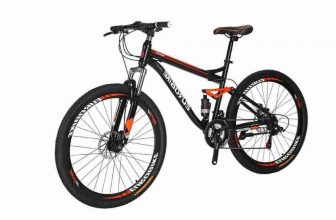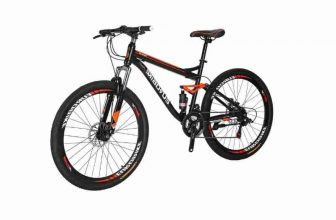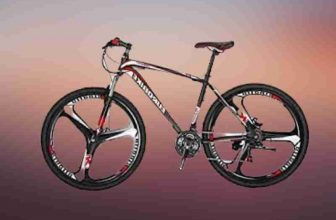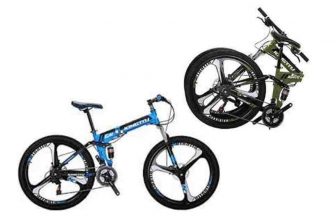
The question that may arise in your mind while you are on one of your biking trips is how long mountain bikes last. This is the average age, and how can I prolong the life of my mountain bike.
To enjoy some of the benefits of mountain biking, you must first know that mountain biking improves cardiovascular fitness. It boosts the immune system, reduces stress, and increases mood. It also improves balance and coordination.
It’s critical to assess the value of the trip before you get on your bike. How long will it last if you sell your mountain bike, and how much value will it have?
The function of a mountain bike is to excel at steep descents while maintaining nimbleness and lightness for cycling upwards. Mountain bikes are designed to cope with more than just what Mother Nature throws at them.
A mountain bike can range from 16 to 20 years if properly maintained. If neglected, it can be rendered unusable in as little as five years.
The points covered in this article pertain to people preparing to get a mountain bike for the first time. They include knowing how long a mountain bike will last, what impacts it, and what you can do to keep your bike in great shape. Keep reading to find out what you need to know:
When it comes to mountain bikes, how long do they last?
Mountain bikes have an expiration date; regardless of how well you maintain yours, you’ll eventually have to say goodbye.
It cannot be delightful when your bike breaks down since these bikes can cost several thousand dollars. What is the life expectancy of a mountain bike?
Of course, the tires and chains will need replacing over time, but you can expect a well-loved, high-quality mountain bike to last you easily 20 years!
Nevertheless, every bike will be handled differently and used differently, resulting in no two surviving as long as one another.
In some cases, the price of your bike could determine the quality of the materials used, resulting in a shorter lifespan.
How long your bike lasts can be significantly affected by your suspension, for instance. The more abuse your bike can take before it fails, the better the suspension is.
Lifespan Determinants of Mountain Bikes
The following tips will prolong your mountain bike’s life and keep it in good shape:
1. Regular maintenance
Maintaining your bike regularly is essential if you plan on riding it for an extended period. It’s a fact that mountain bikes are made to get dirty.
However, allowing dirt to settle on for an extended period can lead to premature wear and tear of the bike’s components. Keep your bike clean by thoroughly washing it regularly.
Instead of using a power washer to clean your vehicle, you should use a soft vehicle wash soap and a brush to clean the hard-to-reach crevices. Make sure your drivetrain is cleaned periodically to remove accumulated gunk.
2. Don’t grind your gears and strain your chain
It’s more science than art to shift a mountain bike on trial. A hilly ride could put a lot of stress on your drivetrain, resulting in loud, annoying noises when you can’t find the right gear.
The chain, chainring, cassette, and other bike components, may suffer long-term damage as a result. By anticipating the shift, you can execute it correctly rather than hammer it. Powertrain longevity is directly impacted by how and when you shift gears.
3. Give Your Brakes a Break
An unchecked brake system often causes a vehicle to have a disabling accident. The battery will not last long if you slam on the brakes or bomb into bends.
It is prudent to use light braking when approaching bends, and it is also advisable to practice rolling your bicycle through bends without breaking. Consequently, your bike will be able to reach higher speeds, and your brake pads will last longer.
Also, it is strongly recommended that you do not apply the back brake. If you are using the front brake, ensure that you apply it in a controlled manner to assist with cornering.
Furthermore, you should feather your brakes so that they will be lessened gradually, rather than immediately pressing them down.
4. Mountain Bike Suspension Should Not Be Neglected
Many riders do not give much thought to the suspension of their mountain bike once the sag has been set. The fork stanchions collect dirt and grit after every ride, and if not cleaned, this can lead to malfunctions. When the air pressure is not maintained, it will deteriorate over time.
If the suspension bottoms out after a significant collision, a failure to regularly check the pressure may lead to significant damage.
Fluids such as shocks and forks must be changed regularly, like engine oil.
It is possible to end up buying a new shock or fork if you ignore your suspension and do not rebuild it properly. Consequently, it would help if you did not disregard your bicycle.
5. Maintain Proper Tire Pressure
To keep your tires firm, make it a habit to press them down regularly. Squeezing the tire is not the proper way to measure tire pressure.
At least once per week, you should check the pressure in your tires using a digital tire pressure gauge, which you can buy.
To prevent pinch flats while riding, you need to watch your tire pressure. In the most extreme case, you will damage the rim.
Schedule for Mountain Bike Maintenance
To keep your bike working as long as possible, follow this basic maintenance schedule:
Every Ride
Make sure your tires are properly inflated.
Wipe off any moisture or dirt
Lube the chain and clean it off to remove any excess
Check the following items every week:
Shock absorber pressure
Replace brake pads when they reach a thickness of less than 1mm.
Check bolts and wires and tighten if necessary
Every 4 Months
Thoroughly remove any dirt and oil off the bike
Hydraulic brake fluid should be replaced if it is dark.
Change the seals and oil in the suspension
Check treads on the tires
Every Calendar Year
Dispose of the handles
Thoroughly clean the bike.
Check the frame for damage
When Should You Replace Your Mountain Bike
Several warning indicators indicate that you need a new mountain bike. Some of those items cost a lot of money to fix or repair by hand.
You should get a new mountain bike if the frame of your old one has been compromised, and replacing it would be too expensive.
Nevertheless, there are some tell-tell signals you should consider replacing your mountain bike based on my own experience. The easiest factor to measure is comfort and feel and whether you outgrow the bike in weight, size, and weight.
If you are having trouble finding replacement parts for your bike, you should watch for damage indicators or resell them.
In addition, your interest in mountain biking has grown over the years.
Frequently Asked Questions
How often should I have my bike’s chain checked and adjusted?
A mountain bike chain should be lubricated every 2,000 miles.
What telltale signs do your mountain bike tires need to be replaced?
When the knobs on the tread of your mountain bike tires are more than halfway worn down, it’s time to replace them. Experienced riders can frequently tell when their tires need to be replaced based on how the bike handles during a ride.
Is it risky to engage in mountain biking?
Specific hazards must be considered. Riding a bike on challenging terrain increases your risk of injury. On the other hand, road biking has an injury rate that is more than twice as high as mountain biking. Most people don’t think road biking is dangerous, but it’s twice as deadly as mountain biking.
How long do cheap bikes last?
Cheap bikes are not designed to last very long if you use them for this purpose. A cheap bike may only last you a few trails in this situation because they are not equipped to handle them.
Generally, cheaper, heap, low-grade materials are more prone to break. For example, if the frame isn’t solid enough, one tricky landing may result in a fractured frame and possibly broken bones. In addition, cheap bikes will not stop you if you need to stop suddenly.
If you’re traveling downhill for an extended amount of time on brakes that aren’t up to snuff, they may overheat and fail. So, it’s crucial to factor in usage before settling on a cheaper, generic store-bought mountain bike.
Final Words
It mainly depends on the quality of the bike, features like suspension, and how you ride it.
If you choose a cheaper alternative, you won’t be able to use it on mountain trails or rugged terrain without putting yourself at significant risk of harm. These bikes are usually not durable enough or manufactured from high-quality material to endure the damage these bikes have to undergo. As a result, you shouldn’t expect your bike to last very long.
However, if you plan to use it for road riding and commuting, it may last you many years. Alternatively, if you choose a more expensive, full-suspension model, your bike’s longevity will be increased.
Since complete suspension bikes are generally more expensive and constructed of higher quality materials, they are better suited to off-mountain use than other bikes.
If you maintain quality and care, your mountain bike might last you years and years.






